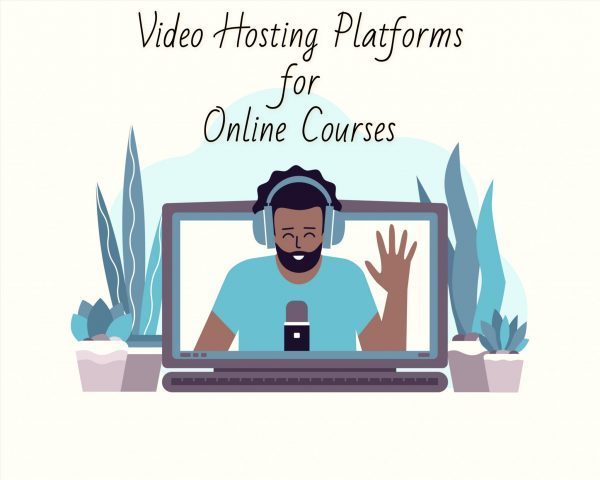Video-based learning, now a common practice in e-learning, is acquiring an understanding of a concept by the means of a video lesson accessible through electronic media. Our previous blogs provided an introduction to this teaching methodology and highlighted its benefits. Presently, educators around the world are either trying to create video-based courses or are already using one. However, hosting a video-based course is a bigger task than creating it. It requires adequate video hosting platforms that provide enough storage, speed, and audience. Read further to find out about video hosting and suitable video hosting platforms for beginners.
Why Use Video Hosting Platforms?
Videos take up a lot of storage space. This hinders the speed of servers and has an impact on the video quality. Also, not all platforms can provide an appropriate audience for a video-based course. Consequently, it is important to choose a video hosting platform with a relevant audience.
Moreover, the demand for high-definition videos is on a constant rise. These high-quality videos take up more hardware storage. As a result, they require a dedicated server capable of handling a significant amount of traffic. Uploading videos on a website can be taxing for a server, which affects the entire functionality of a platform. Hence, using a video hosting platform is more convenient.
Top 7 Video Hosting Platforms
There are many video hosting platforms offering a plethora of hosting options. Many of these are free to use with a paid upgrade option to avail advanced features.
The top 7 video hosting platforms have been described below.
1. YouTube
YouTube is the largest video-sharing platform with over 2 billion users worldwide. Also, it is the second-largest search engine after Google. It contains numerous video lessons uploaded by its various users. This platform provides several convenient features, including automatic transcription for more accessibility. Most YouTube videos are easily downloadable, which means a course can easily be copied and distributed. Consequently, there are more privacy breaches. However, the paid version of YouTube offers security options with ad-free services and other premium features.
Another feature is the search engine visibility of YouTube videos. This signifies that users can discover videos simply with a Google search. It makes YouTube one of the best video hosting platforms for online courses.
2. Vimeo
Vimeo is a professional interface for video sharing. Although it offers comparatively less upload space and customization, more privacy controls are available to the users. It provides powerful video analytics and high-quality videos without ads. Also, the video download option is only available if the creator enables it. This protects the videos and content from unwanted distribution. This platform is beneficial for creative professionals, including educators who wish to share their work with a large audience.
Although there are fewer customizations available in the free version, Vimeo offers four types of upgrade plans based on a user’s requirements. Upgrading to a paid version offers more customization and comes with more cloud storage space.
3. Wistia
Wistia is a professional digital marketing platform. It offers a wide range of marketing tools, including a built-in call to action button. Users can upload videos and embed links to their website in between. It offers a completely customizable embedded player that highlights videos from the same user. However, there are no video recommendations from other channels. It is also useful for CRM integration and custom branding because it helps create a custom audience for different social media platforms.
4. Facebook
Facebook is a ubiquitous social media platform and one of the most prominently used platforms for video hosting. It offers the biggest audience with a large number of visitors each day. Users can showcase their creativity by creating and uploading videos on Facebook. Moreover, it supports different aspect ratios and provides unlimited file storage. Although there are fewer options available to embed videos, Facebook is still useful for creating brand awareness.
5. WordPress Video Hosting
WordPress offers video hosting options in its premium and professional plans. Users must install the Jetpack plugin to access unlimited video hosting options. WordPress accepts videos in different formats, namely, .MOV, .MPEG4, MP4, .AVI, and others. Also, it offers a customizable embedded video player with video stats available on the WordPress dashboard.
A drawback of WordPress video hosting is that it does not have the premium features that other video hosting platforms offer. Also, it does not have an established audience. As a result, WordPress video hosting might not seem a good idea for someone targeting a large audience in less time.
6. Brightcove
Brightcove is a paid video hosting platform that has a fast server and powerful live-streaming options. It is a scalable solution used by many Fortune 500 companies because it does not have any resolution limit and supports all aspect ratios. It also supports all upload sizes without any issues. However, the storage depends on the plan selected.
In conclusion, Brightcove is a complete enterprise solution that supports advanced integrations for large-scale marketing and communications.
7. Dailymotion
Dailymotion is somewhat similar to YouTube. It is a platform with over 300 million unique users. This platform provides free unlimited video hosting with advanced security options. The host can protect their videos with passwords or make them private. Also, users enjoy unlimited file storage and can upload videos in the desired formats.
However, the maximum upload limit is restricted to 2GB with a maximum video length of one hour. There is less competition so building an audience becomes easy. However, there are frequent ads and issues with embedding videos on the websites.
Final Note
There are a variety of video-hosting platforms available for various unique users for free or at a low cost. Choosing the right platform requires a thorough analysis of the needs and requirements of the user. They can then compare and choose a suitable platform that serves their purpose.
Read more about Video Learning here.
Research articles: Wondershare Filmora and Kinsta
Images:
For more information on Video-Based Learning, visit our blog.
Create. Engage. Inspire.

















